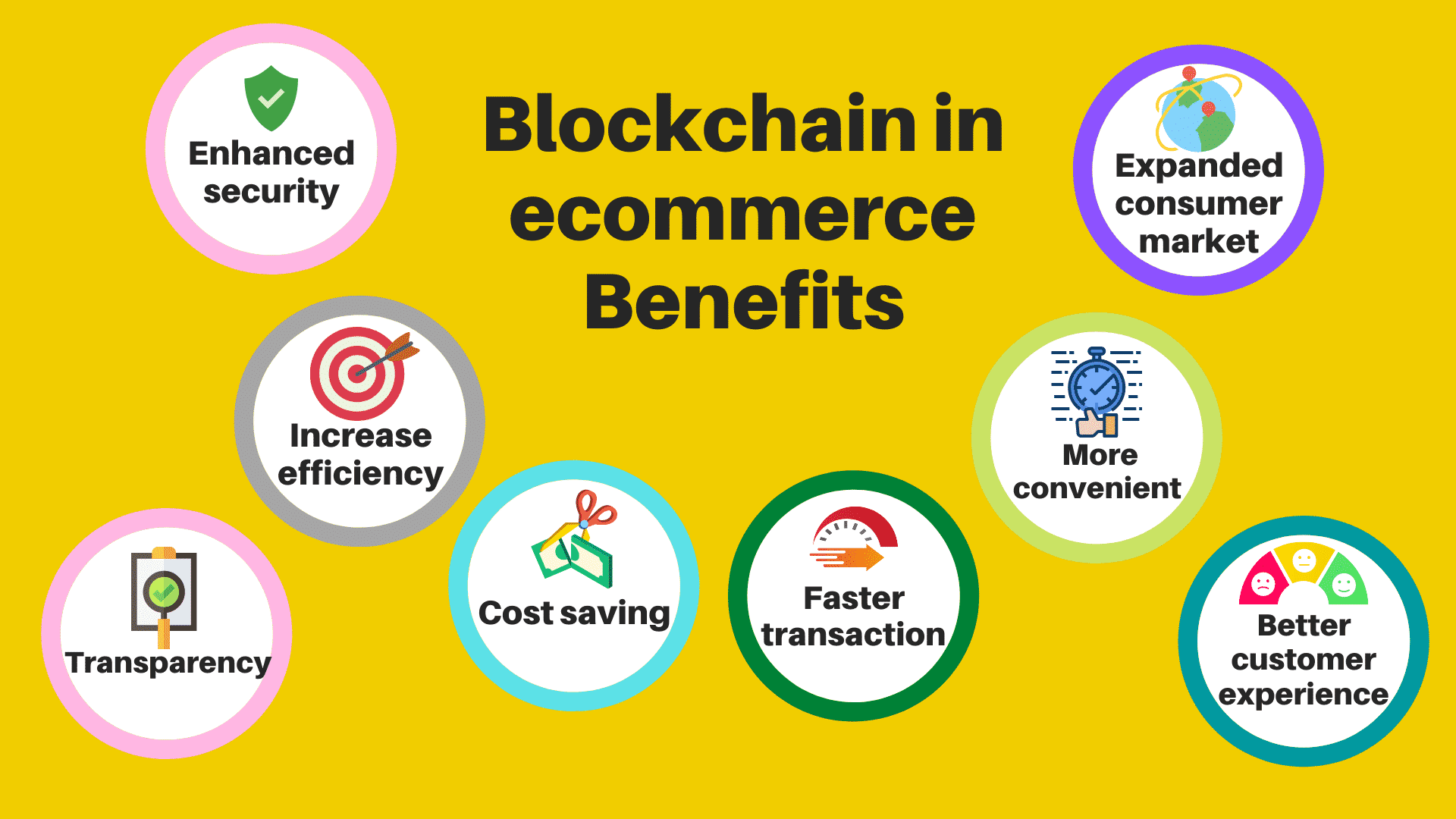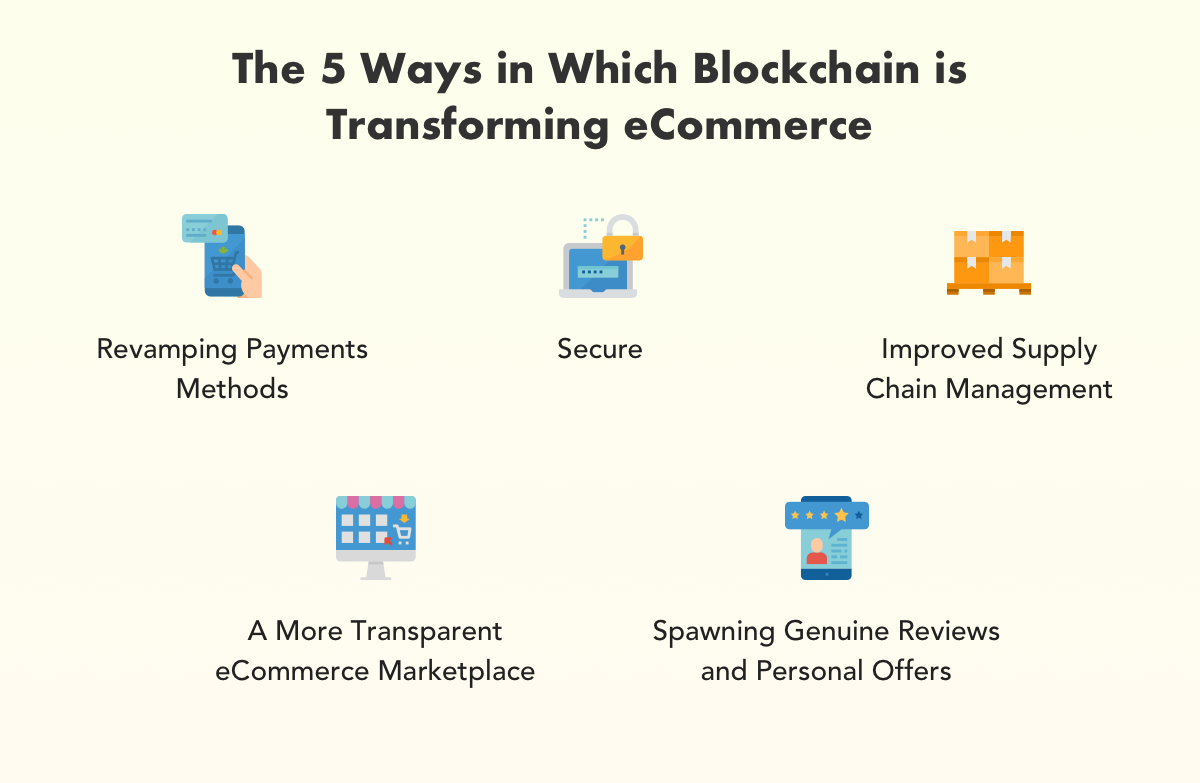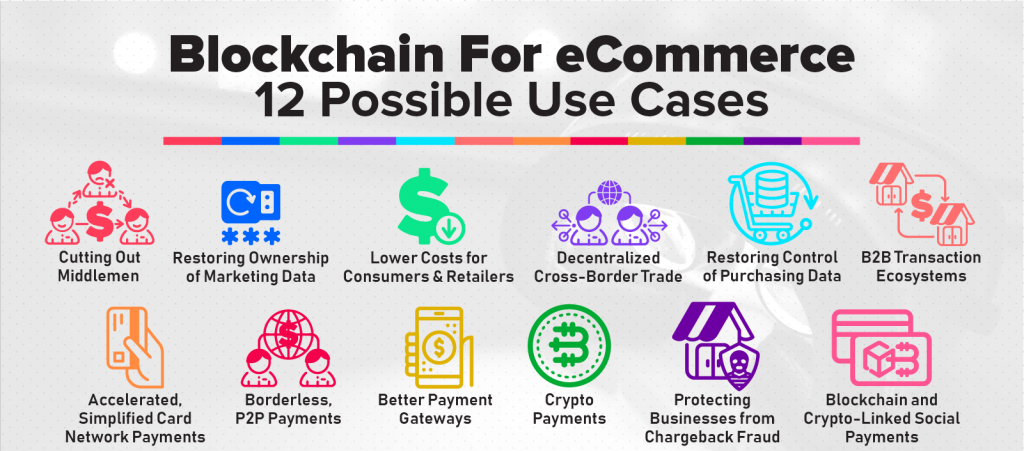SERVICES BY US
Ecommerce & Blockchain
Blockchain technology can be useful in e-commerce:
- Supply chain management: Blockchain technology can provide a secure, decentralized, and transparent way to track the movement of goods from the manufacturer to the end consumer. By creating an immutable and transparent record of each step in the supply chain, blockchain can increase transparency, reduce fraud, improve efficiency, and build trust between buyers and sellers.
For example, a blockchain-based supply chain system can track the sourcing of raw materials, production, quality control checks, distribution, and delivery of products. This information can be accessed by all parties involved in the supply chain, including manufacturers, suppliers, logistics companies, and customers. The transparency provided by the blockchain can help build trust between buyers and sellers, as customers can have confidence that the products they purchase are authentic and of high quality, while sellers can trust that they are receiving payment for genuine products.

- Payments and financial transactions: Blockchain technology can be used to facilitate faster, more secure, and less expensive payments between buyers and sellers. Cryptocurrencies such as Bitcoin and Ethereum are examples of blockchain-based payment systems that eliminate the need for intermediaries such as banks or credit card companies.
By using blockchain-based payment systems, e-commerce companies can reduce transaction fees, eliminate chargebacks and fraud, and increase the speed and security of payments. Additionally, blockchain-based payment systems can be used to facilitate cross-border payments, which can be slow and expensive using traditional payment methods.
- Identity and authentication: Blockchain technology can be used to create secure and decentralized identity and authentication systems. By storing identity information on the blockchain, users can maintain control over their personal information and reduce the risk of identity theft.
For example, a blockchain-based identity system can store a user’s identity information, such as their name, date of birth, and address, on the blockchain. This information can be verified by other parties on the blockchain, reducing the need for traditional forms of identity verification such as passports or driver’s licenses. This can increase security, reduce fraud, and improve the customer experience.
- Decentralized marketplaces: Blockchain technology can enable the creation of decentralized marketplaces, where buyers and sellers can transact without the need for intermediaries such as Amazon or eBay. By using blockchain technology, decentralized marketplaces can reduce costs, increase transparency, and improve efficiency.

For example, a blockchain-based marketplace can allow buyers and sellers to transact directly with each other using cryptocurrencies. This can eliminate the need for intermediaries such as payment processors or escrow services, reducing transaction fees and increasing efficiency. Additionally, decentralized marketplaces can provide more transparency into pricing, as buyers and sellers can see the prices being offered by other participants in the marketplace.
- Loyalty programs and incentives: Blockchain technology can be used to create loyalty programs and incentive systems, where customers are rewarded for their loyalty or for participating in certain activities. By using blockchain-based loyalty programs, e-commerce companies can increase customer engagement, improve customer retention, and reduce costs associated with traditional loyalty programs.
For example, a blockchain-based loyalty program can reward customers with tokens or cryptocurrencies that can be redeemed for products or services. These rewards can be stored on the blockchain and redeemed at a later time, providing customers with a more flexible and convenient way to redeem their rewards.
Overall, blockchain technology has the potential to transform e-commerce by increasing transparency, reducing fraud, improving efficiency, and building trust between buyers and sellers. As the technology continues to develop, we can expect to see more innovative applications of blockchain in e-commerce.

Few blockchain case studies for e-commerce:
- Walmart and IBM’s Food Traceability System: Walmart and IBM created a blockchain-based system to track the movement of food products through the supply chain, from the farm to the store. The system is designed to improve food safety and reduce the time it takes to trace the source of foodborne illnesses. Walmart is now requiring its suppliers of leafy greens to use this blockchain-based system.
Shopify’s Partnership with Sweetbridge: Shopify, a popular e-commerce platform, partnered with Sweetbridge, a blockchain-based supply chain management platform, to create a decentralized inventory and invoice financing system. This system allows merchants to access financing for their inventory and invoices at lower rates than traditional lenders.
- Overstock’s TØ Platform: Overstock, an online retailer, created the TØ platform, a blockchain-based platform for trading securities. The platform allows for faster and more secure trading of securities, reducing the need for intermediaries and decreasing the cost of trading.
- VeChain’s Partnership with Bright Foods: VeChain, a blockchain platform focused on supply chain management, partnered with Bright Foods, a Chinese food company, to create a blockchain-based system to track the movement of pork products through the supply chain. The system is designed to improve food safety and increase transparency in the supply chain.
OpenBazaar’s Decentralized Marketplace: OpenBazaar is a decentralized e-commerce marketplace built on the Bitcoin blockchain. It allows buyers and sellers to transact directly without intermediaries, reducing fees and increasing privacy.
Services categories
About us

Our goal is to help our clients achieve their online goals by providing them with customized, effective, and results-driven solutions that drive growth, increase visibility, and strengthen their online presence.
Contact info
Address office
USA, INDIA, VIETNAM
Phone